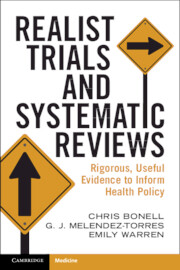Book contents
- Realist Trials and Systematic Reviews
- Reviews
- Realist Trials and Systematic Reviews
- Copyright page
- Contents
- Figures
- Tables
- Boxes
- Acknowledgements
- Chapter 1 Introduction
- Chapter 2 Why Are Trials and Systematic Reviews Necessary but Currently Insufficient to Inform Health Policy?
- Chapter 3 Realist Critiques and Manifesto for Evaluation and Reviews
- Chapter 4 Building Realist Theory in Evaluations
- Chapter 5 Refining Realist Theory through Process Evaluations
- Chapter 6 Testing Realist Theory through Trials or Other Evaluation Designs
- Chapter 7 Building and Refining Realist Theory in Systematic Reviews
- Chapter 8 Testing Realist Theory through Synthesising Outcome Evaluations
- Chapter 9 Using Evidence to Inform Intervention Scale-Up and Transfer
- Chapter 10 Using Evidence to Refine Middle Range Theory
- Conclusion
- References
- Index
Chapter 10 - Using Evidence to Refine Middle Range Theory
Published online by Cambridge University Press: 08 February 2024
- Realist Trials and Systematic Reviews
- Reviews
- Realist Trials and Systematic Reviews
- Copyright page
- Contents
- Figures
- Tables
- Boxes
- Acknowledgements
- Chapter 1 Introduction
- Chapter 2 Why Are Trials and Systematic Reviews Necessary but Currently Insufficient to Inform Health Policy?
- Chapter 3 Realist Critiques and Manifesto for Evaluation and Reviews
- Chapter 4 Building Realist Theory in Evaluations
- Chapter 5 Refining Realist Theory through Process Evaluations
- Chapter 6 Testing Realist Theory through Trials or Other Evaluation Designs
- Chapter 7 Building and Refining Realist Theory in Systematic Reviews
- Chapter 8 Testing Realist Theory through Synthesising Outcome Evaluations
- Chapter 9 Using Evidence to Inform Intervention Scale-Up and Transfer
- Chapter 10 Using Evidence to Refine Middle Range Theory
- Conclusion
- References
- Index
Summary
This chapter reflects on how evidence from realist trials and systematic reviews might be of value, not only in drawing conclusions about specific interventions and their theories of change but also in testing and refining the middle range theories which inform these and other interventions. While evaluation evidence should be of most immediate use in informing decisions about the implementation of the specific interventions being evaluated, a broader and more enduring use for evaluation could be in suggesting refinements to middle range theory. Such refinements might then be used to inform and influence the next generation of complex health interventions. In order to be useful in assessing the validity of middle range theory, evaluations will need to assess interventions informed by a limited number of middle range theories comprising a limited number of well-defined constructs. There may be value in conducting proof of principle studies separately from more pragmatic evaluations in order to test and refine middle range theory.
Keywords
- Type
- Chapter
- Information
- Realist Trials and Systematic ReviewsRigorous, Useful Evidence to Inform Health Policy, pp. 89 - 98Publisher: Cambridge University PressPrint publication year: 2024



